Anubis is one of the most recognizable figures in Egyptian mythology, known as the god of mummification and the afterlife. With his jackal head and human body, he has become a popular subject for tattoos, representing various meanings for those who choose to ink him on their skin. In this article with Impeccable Nest, we’ll explore the symbolism behind Anubis and how it is interpreted in tattoo art.
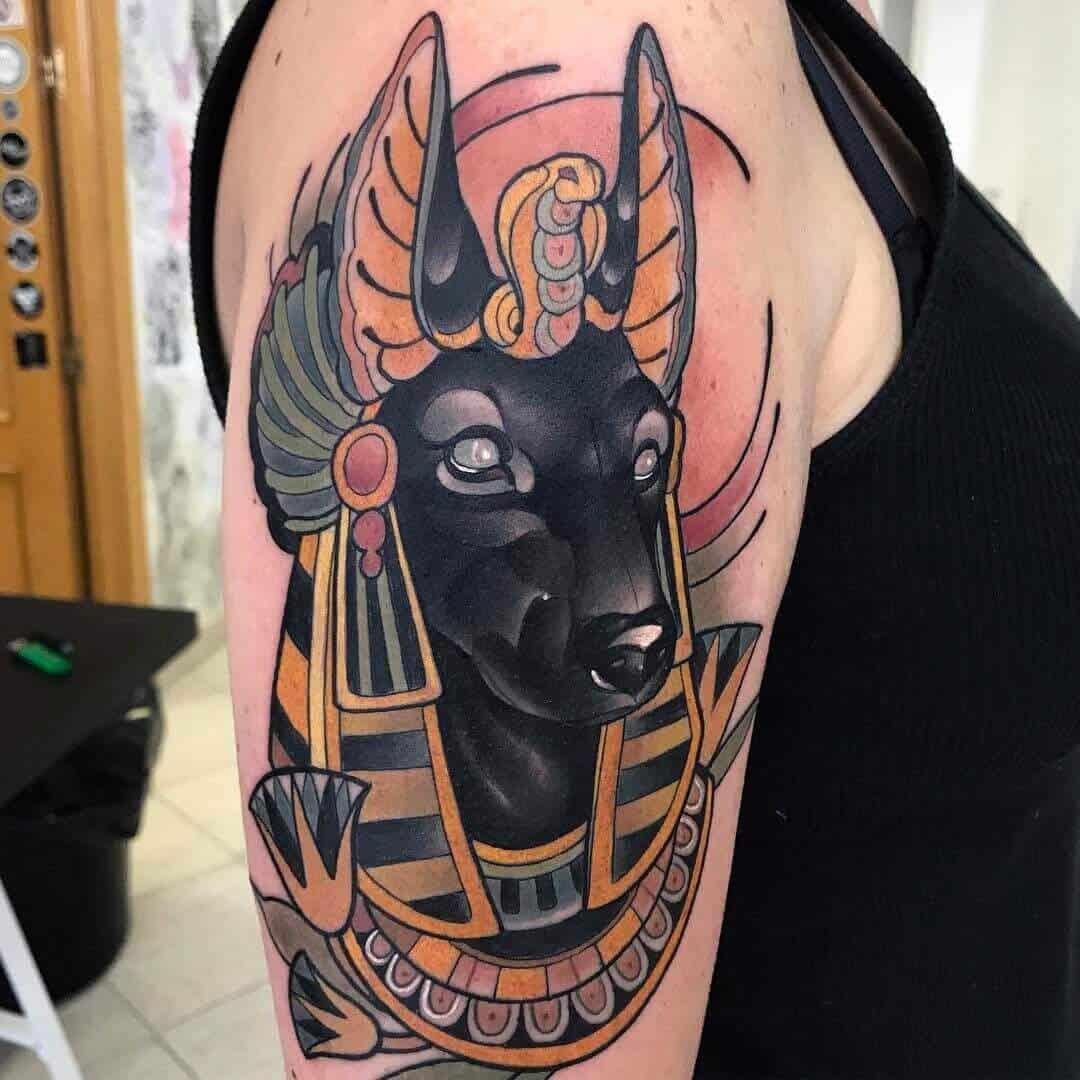
The Origins of Anubis
Anubis was first mentioned in the Old Kingdom period of Egypt (c. 2686-2181 BCE), but his origins may date back even further to pre-dynastic times. He was originally known as Anpu or Inpu and was associated with the funerary cults of Osiris and Khentiamentiu. As the god of mummification, he oversaw the embalming process and ensured that the deceased would be properly prepared for the afterlife.
Over time, Anubis became associated with the weighing of the heart ceremony, where the heart of the deceased was weighed against the feather of Ma’at to determine their worthiness to enter the afterlife. This made him a crucial figure in Egyptian mythology and solidified his position as a protector of the dead.
Unveiling the Symbolic Power: Anubis Meaning Tattoo Explored
When it comes to tattoo designs, Anubis is often depicted in various poses and styles. Some people choose a realistic depiction of the god, while others opt for a more stylized or abstract representation. The placement of the tattoo can also vary depending on personal preference, with popular spots being the chest, back, or forearm.
But what do these tattoos symbolize? Here are some common interpretations:
Protection
Anubis is an ancient Egyptian god associated with mummification and the afterlife. This deity was often depicted with the head of a jackal, a creature that was closely linked to death and burial practices in ancient Egypt. Anubis was also seen as a protector of the dead, guiding them through the underworld and ensuring that they reached their final resting place.
Tattoos featuring Anubis are popular for a variety of reasons, one of which is the sense of protection that this deity can offer. For some people, getting a tattoo of Anubis may be a way of invoking his protective powers and warding off negative influences or entities. This can be especially meaningful for individuals who have experienced trauma or loss, as Anubis is also seen as a guardian of the deceased.
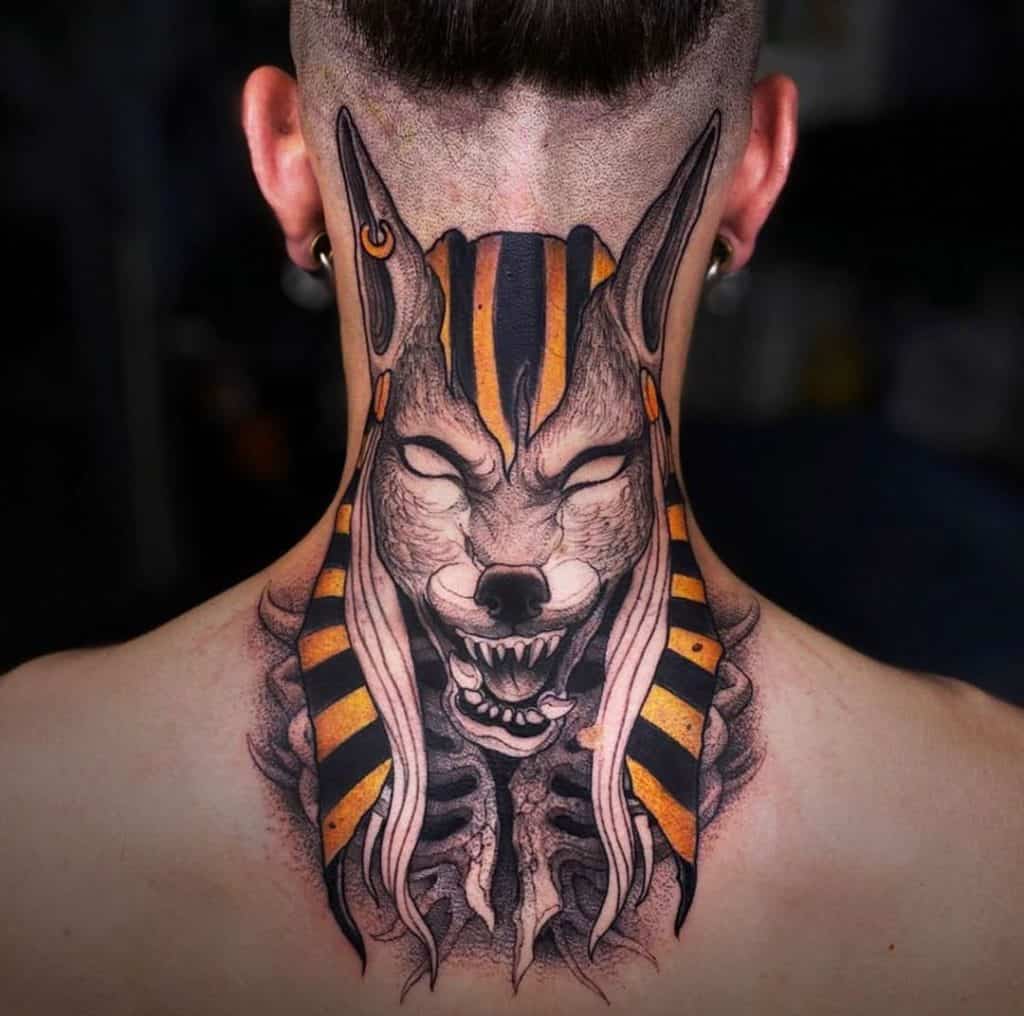
In addition, tattoos of Anubis can serve as a tribute to someone who has passed away. By incorporating this god into the design, the tattoo can symbolize the idea that the deceased is being watched over and protected by Anubis. This can bring comfort to those who are grieving, as it offers a symbolic connection to their departed loved one.
Another reason why Anubis tattoos have become so popular is their striking visual appeal. The intricate designs and bold lines used in many Anubis tattoos make them a visually stunning choice for body art. They can also be a powerful way of expressing one’s connection to ancient Egyptian mythology and culture.
Transition
A tattoo of Anubis, the ancient Egyptian god of mummification and the afterlife, can hold significant symbolic meaning for the individual who bears it. In Egyptian mythology, Anubis was responsible for guiding the souls of the deceased into the afterlife and overseeing their judgement in the scales of Ma’at.
Because of its association with death and rebirth, a tattoo of Anubis can represent a major life change or personal transformation for the wearer. This could be interpreted in a variety of ways, depending on the individual’s experience and perspective.
For example, someone who has overcome a serious illness or injury may choose to get an Anubis tattoo as a way of celebrating their physical and emotional recovery. The image of Anubis as a guide through the underworld can symbolize their journey through hardship and their emergence into a new phase of life.
Similarly, a person who has undergone a significant spiritual or psychological transformation may find that an Anubis tattoo resonates with their experience. Anubis is often depicted as a protector and guardian of the dead, and his presence can offer comfort and reassurance to those who are navigating unfamiliar territory in their own lives.
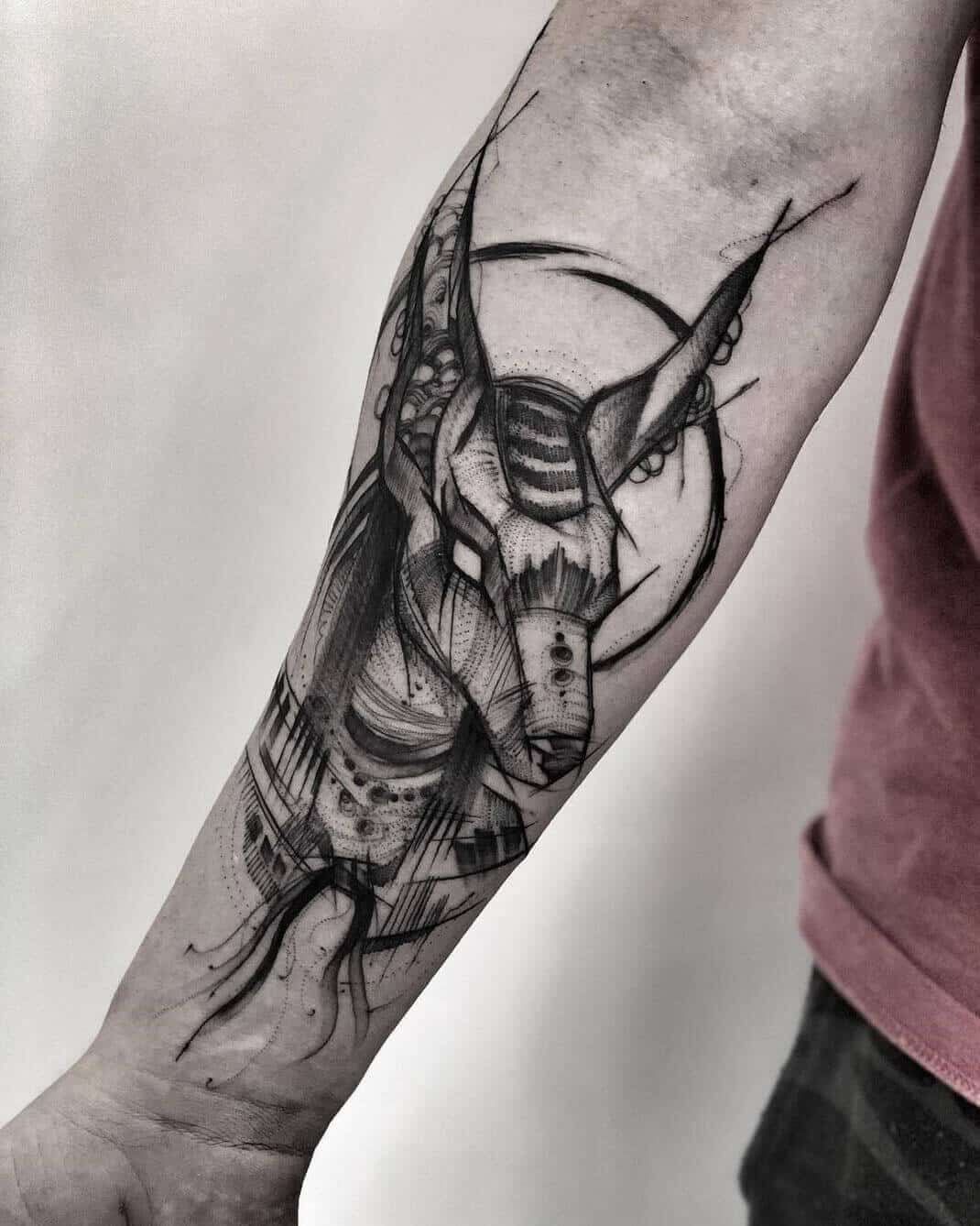
In addition to representing personal transformation, an Anubis tattoo can also be a nod to the rich cultural heritage of ancient Egypt. Many people are drawn to the elegance and beauty of Egyptian art and mythology, and a tattoo of Anubis can serve as a tribute to this fascinating and complex civilization.
Loyalty
A tattoo of Anubis, the ancient Egyptian God of mummification and the afterlife, can hold significant meaning for those who choose to adorn their body with such an image. Anubis is often depicted as a jackal-headed figure, and his role in mythology was to guide the souls of the deceased through the journey of death and into the afterlife.
For some individuals, getting a tattoo of Anubis may represent their loyalty to a loved one who has passed away. They may believe that Anubis will guide their loved one’s soul into the afterlife and ensure that they are protected and cared for throughout their journey. The tattoo serves as a constant reminder of the love and bond they shared with their departed loved one, and it can provide comfort and solace in times of grief and mourning.
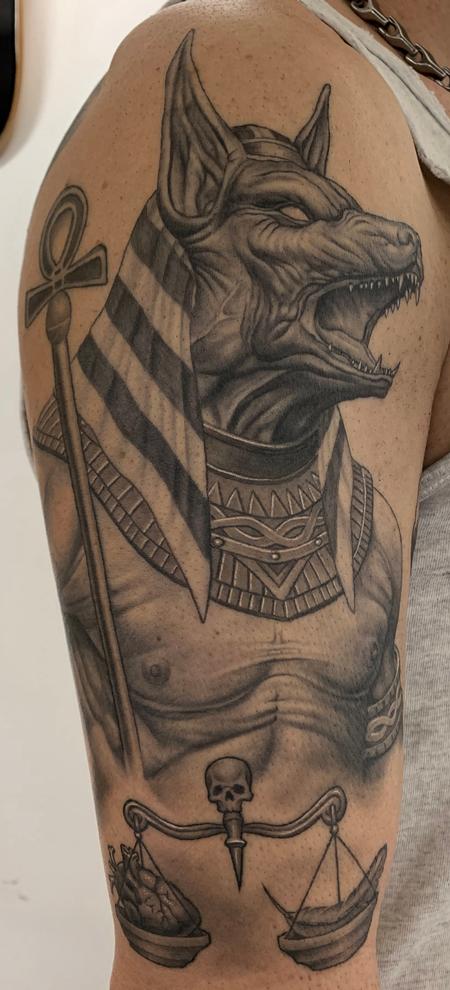
Others may choose to get a tattoo of Anubis as a symbol of their loyalty to a particular cause or belief system. Anubis was revered in ancient Egyptian culture as a powerful deity who presided over matters of life and death. As such, those who choose to get a tattoo of Anubis may see him as a symbol of strength and power, and they may feel a sense of devotion to the values and principles that he represents.
In addition to representing loyalty and devotion, a tattoo of Anubis can also be seen as a symbol of protection. In ancient Egyptian mythology, Anubis was believed to have the power to protect the souls of the deceased from harm in the afterlife. Those who get a tattoo of Anubis may feel that they are being watched over and protected by this powerful deity, and they may draw strength and comfort from this belief.
Spiritual Connection
A tattoo of Anubis, the ancient Egyptian god of the afterlife and mummification, can hold significant spiritual and personal meaning for those who choose to get it inked onto their skin. Anubis is often depicted as a jackal or a man with a jackal’s head, and he was believed to guide souls through the underworld and weigh them against the feather of truth.
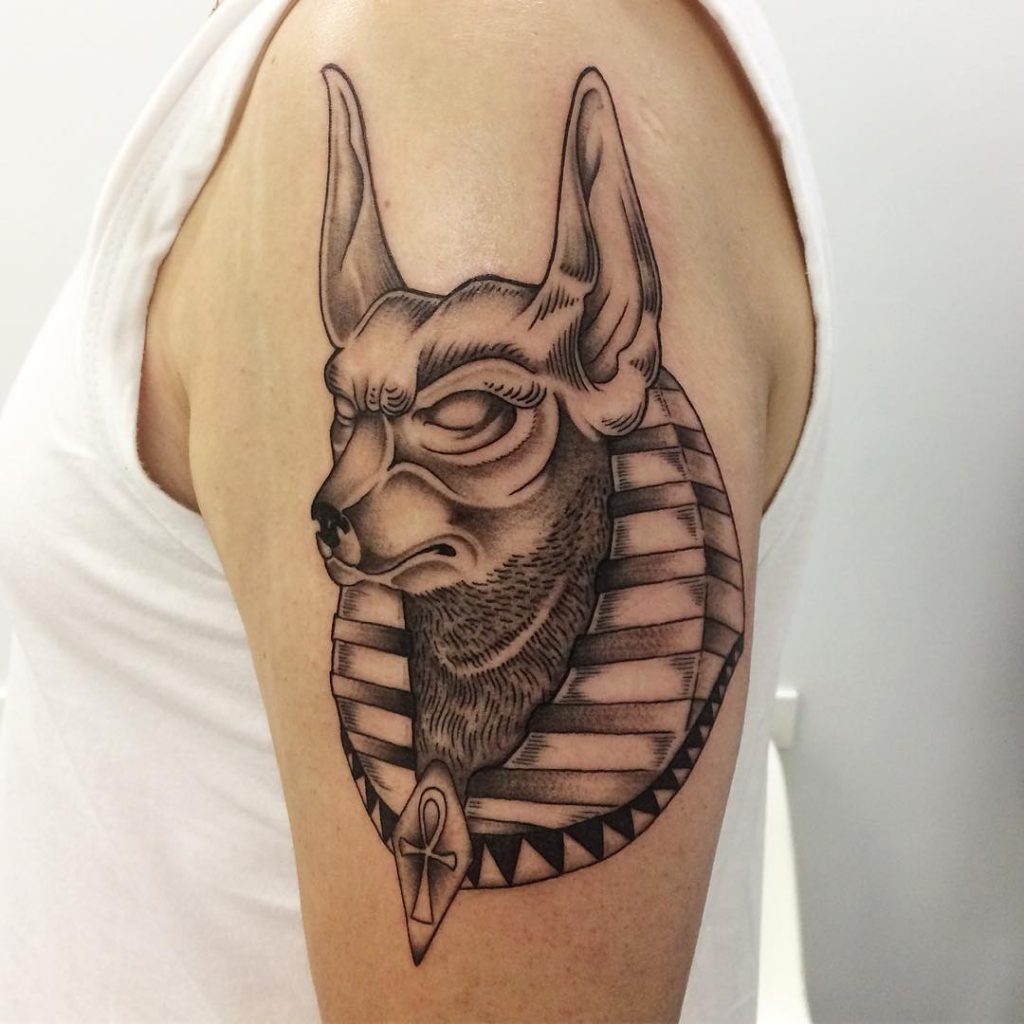
For individuals who align with the teachings and beliefs of ancient Egyptian spirituality, a tattoo of Anubis can serve as a permanent symbol of their connection to this ancient culture and its beliefs. Some might see the tattoo as a means of channeling Anubis’ power and protection in life, while others might view it as a tribute to a deity they admire and respect.
Furthermore, for those who are intrigued by mythology and symbolism, a tattoo of Anubis can represent their fascination with this mysterious deity and the stories associated with him. The tattoo can also serve as a conversation starter, allowing the wearer to share their interests and passion for history and mythology with others.
Death and Rebirth
Anubis is an ancient Egyptian deity associated with mummification and the afterlife. As such, tattoos depicting Anubis can carry a variety of meanings, depending on the individual’s interpretation and cultural context.
One common interpretation of Anubis tattoos is rooted in the cyclical nature of life and death. In ancient Egyptian mythology, Anubis was responsible for guiding souls through the afterlife and judging their worthiness for eternal rest. He was also closely associated with the process of mummification, which was a way to preserve the body for the afterlife.
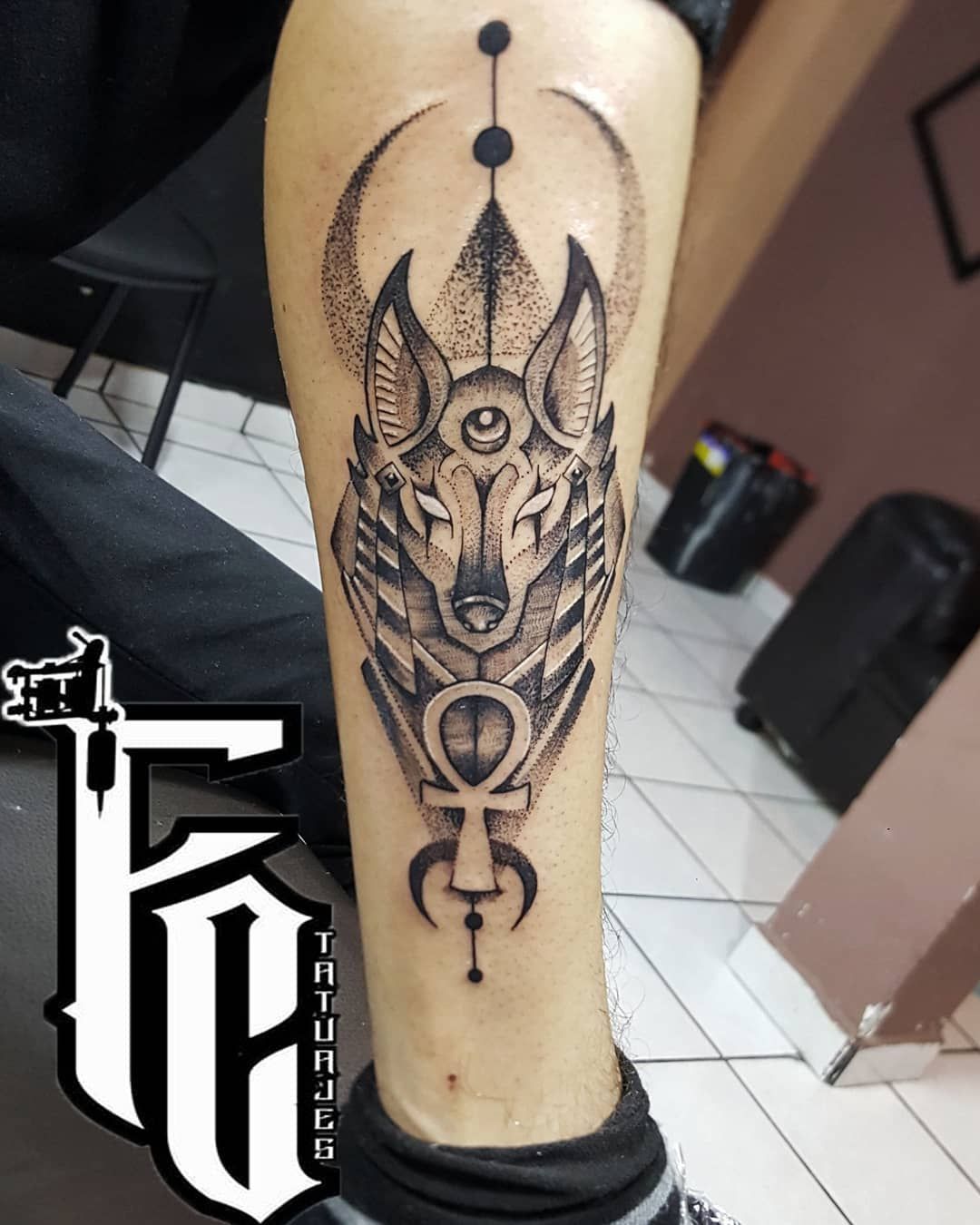
From this perspective, tattoos of Anubis can be seen as a reflection of the natural cycles of birth, death, and rebirth. They may serve as a reminder that all things, including ourselves, are part of a larger, interconnected system of life and death.
Another possible interpretation of Anubis tattoos is tied to the belief in reincarnation. In some cultures, it is believed that the soul moves from one body to another after death, either within the same species or across different forms of life. Anubis may be seen as a symbol of this process, representing the transition from one stage of existence to another.
In this context, Anubis tattoos may be viewed as a way to honor the journey of the soul and acknowledge the interconnectedness of all living things. They may also represent a personal belief in the possibility of transformation and renewal, even in the face of death.
Conclusion
Anubis is a fascinating figure in Egyptian mythology, representing the transition from life to death and the afterlife. As a tattoo design, Anubis can symbolize various meanings, from protection and loyalty to spiritual connection and personal transformation. When getting an Anubis tattoo, it’s important to be respectful of the culture and symbolism behind the design and to consult with a reputable artist who can bring your vision to life.

I am Harvey Berry, a tattoo enthusiast who has immersed himself in the diverse world of ink, passionately exploring the beauty and artistry within each tattoo. My mission extends beyond uncovering the aesthetics of tattooing; it involves sharing in-depth knowledge across all aspects of this art form.
Fueled by genuine curiosity and love for every facet of tattooing, I have diligently crafted well-researched articles, with a special focus on the Tattoo Meaning of Impeccable Nest section. Here, my aim is to help the tattoo community gain a deeper understanding of the meanings and values embedded in each tattoo.
One of my primary goals is to encourage responsible decision-making when it comes to getting inked. I recognize that choosing to get a tattoo is a significant personal decision that requires careful consideration. Hence, I provide diverse resources covering the meaning of tattoos, the tattooing process, aftercare tips, and other valuable information.
Whether you are a seasoned tattoo enthusiast or embarking on your first exploration of the world of body art, I aspire to be a reliable resource for you at every step of your journey. I hope that my extensive knowledge of tattoos, especially in the Tattoo Meaning section, will assist you in finding inspiration to express yourself through the art of tattoos.
